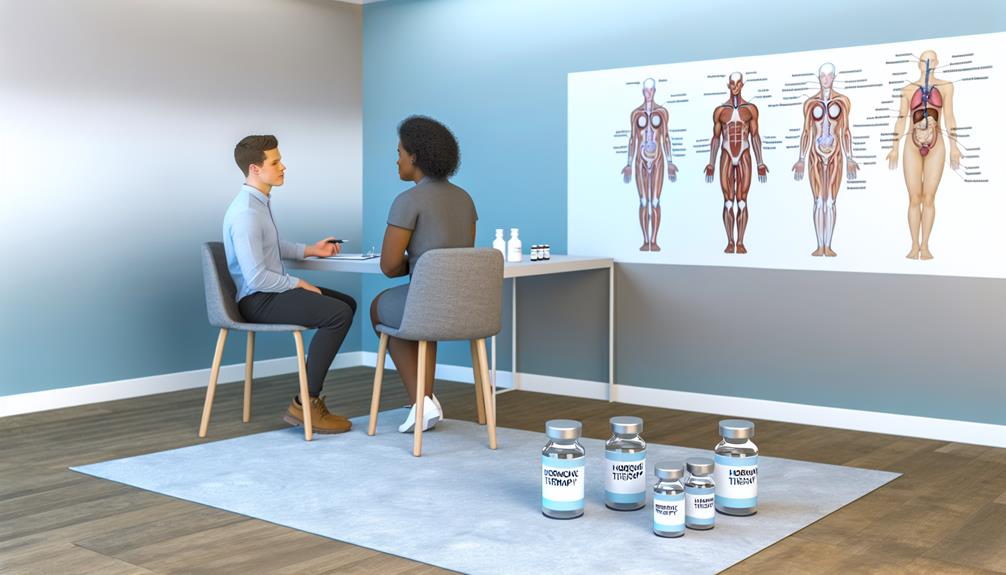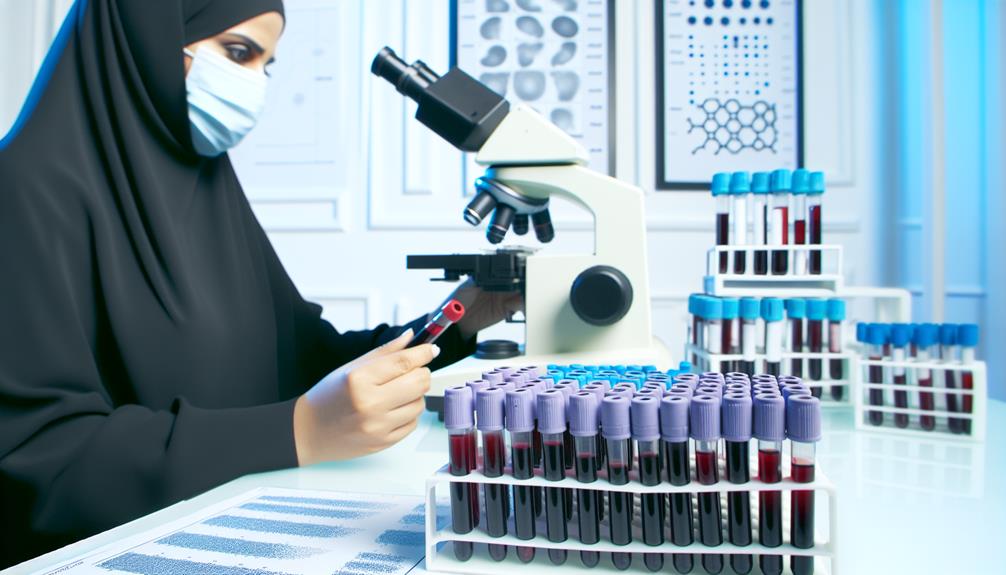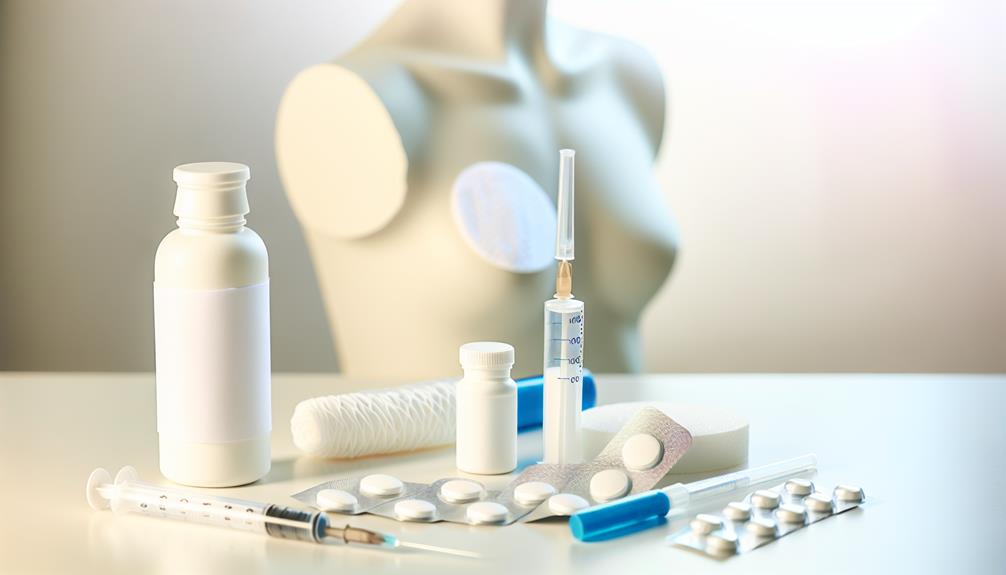When considering hormone therapy, I think it's crucial to understand the types available, such as injectables, topical applications, and pellet implants. These therapies address testosterone imbalances that can affect energy, mood, and muscle mass. However, I must also be aware of potential risks, like cardiovascular complications and hormonal fluctuations. Regular testing and monitoring are fundamental for evaluating effectiveness and safety. Lifestyle changes, including diet and exercise, can support hormone health. Finally, seeking professional guidance guarantees a personalized approach to treatment and helps dispel myths about hormone therapy options. There's a lot to unpack here.
Understanding Hormone Therapy

When pondering hormone therapy, it's imperative to understand its purpose and functions. Hormone therapy primarily aims to address hormone imbalances that can arise due to various factors, including age, lifestyle, and underlying health conditions. The history of hormone therapy dates back to the early 20th century when researchers began to explore the role of hormones in bodily functions. Initially, hormone treatments were rudimentary, but they have evolved considerably, leading to more refined and targeted therapies.
In my exploration of hormone therapy, I've found that maintaining hormone balance is essential for overall health. For men, testosterone is the primary hormone of interest, as it influences various physiological processes such as muscle mass, bone density, and mood regulation. An imbalance, particularly a deficiency, can lead to symptoms like fatigue, decreased libido, and mood swings, prompting the need for therapeutic intervention.
It's worth noting that the approach to hormone therapy must be tailored to individual needs, as each person's hormonal profile is unique. Understanding the potential benefits and risks is paramount before starting any treatment. Research has shown that hormone therapy can improve quality of life for many men, but it's equally important to reflect on potential side effects and long-term implications. This understanding allows for informed decisions about treatment options and helps guarantee that therapy aligns with personal health goals. Consequently, gaining a foundational grasp of hormone therapy is essential for anyone considering it.
Types of Hormone Therapies
Hormone therapy isn't a one-size-fits-all solution; various types exist to address specific needs and conditions in men. When considering hormone therapy, it's essential to understand the different options available to tailor a personalized plan that suits individual requirements.
Here are three common types of hormone therapies:
- Injectable therapies: These involve administering hormones via intramuscular or subcutaneous injections, typically on a biweekly or monthly basis. They can deliver synthetic hormones effectively and allow for dosage adjustments based on response.
- Topical applications: This method includes gels or creams that are applied to the skin. They provide a convenient way to administer hormones, allowing for steady absorption into the bloodstream.
- Pellet implants: These small, solid pellets containing hormones are inserted under the skin, usually in the hip area. They release hormones slowly over several months, offering a long-term solution with minimal maintenance.
Additionally, there are oral supplements and natural alternatives that some men prefer. Combination therapies may involve using more than one method to optimize hormone levels and effects. It's essential to discuss these options with a healthcare provider, as the choice between synthetic hormones and natural alternatives can greatly influence treatment outcomes.
Ultimately, each individual has unique needs, and understanding the various types of hormone therapies available can guide you in making informed decisions about your health.
Benefits of Hormone Therapy

When considering hormone therapy, I've noticed several key benefits that can greatly enhance quality of life. Improved mood stability, enhanced energy levels, and increased muscle mass are just a few of the potential positive outcomes I've observed. Understanding these benefits can help in making an informed decision about whether hormone therapy is right for you.
Improved Mood Stability
Men undergoing hormone therapy often experience improved mood stability, which can considerably enhance their overall quality of life. Achieving hormone balance is essential for emotional resilience, as fluctuations in hormone levels can lead to mood swings, irritability, and anxiety. Through therapy, many find that their emotional responses become more stable and manageable.
The benefits of improved mood stability can include:
- Reduced anxiety: Lower levels of anxiety can foster a more positive outlook on life.
- Enhanced relationships: With better emotional regulation, interactions with family and friends can improve notably.
- Increased focus: A stable mood can lead to better concentration and productivity in daily tasks.
It's essential to understand that the effects of hormone therapy may vary from person to person. Consistent monitoring and adjustments by healthcare professionals can help optimize the treatment. The goal is to restore hormone levels to a range that promotes not only physical health but also mental well-being. By prioritizing hormone balance, men can achieve greater emotional resilience and enjoy a more fulfilling life.
Enhanced Energy Levels
Experiencing a boost in energy levels can be one of the most notable benefits of hormone therapy. As men age, hormone levels, particularly testosterone, tend to decline, often resulting in fatigue and decreased vigor. Hormone therapy can effectively restore these levels, leading to improved energy and overall vitality.
When I began hormone therapy, I noticed a significant increase in my daily energy levels. It felt like the fog had lifted, allowing me to engage more actively in both my professional and personal life. Many of us might turn to energy boosters or vigor supplements, hoping to alleviate fatigue, but these often provide only temporary relief. Hormone therapy, on the other hand, addresses the underlying hormonal imbalance directly.
Clinical studies have shown that men undergoing hormone therapy report higher energy levels and improved motivation compared to those who do not. This enhancement in energy can lead to increased productivity and a better quality of life. If you're considering hormone therapy, it's essential to consult with a healthcare professional to determine the best approach tailored to your individual needs and to explore the potential benefits regarding energy enhancement.
Increased Muscle Mass
A noticeable benefit of hormone therapy is the potential for increased muscle mass. As I've explored hormone therapy options, I've come to understand how testosterone plays a vital role in muscle development and recovery. For men experiencing low testosterone levels, hormone therapy can greatly enhance both strength and overall physical performance.
When considering the impact of hormone therapy on muscle mass, I found several key points to be particularly important:
- Enhanced Muscle Recovery: With higher testosterone levels, the body can recover more efficiently from strength training sessions, allowing for more frequent and intense workouts.
- Increased Strength: Hormone therapy can lead to greater muscle hypertrophy, which translates to improved strength and performance in physical activities.
- Sustained Energy Levels: Elevated testosterone can contribute to higher energy levels, making it easier to engage in regular strength training without feeling fatigued.
Risks and Side Effects
As we explore hormone therapy, it's essential to understand the common risks and potential side effects associated with treatment. I'll outline these aspects to provide you with a clear perspective on what to expect. This information can help you make an informed decision about your hormone therapy journey.
Common Hormone Therapy Risks
Hormone therapy for men can offer significant benefits, but it's important to be aware of the common risks and side effects associated with treatment. When considering hormone therapy, I learned that there are inherent risks tied to the different treatment options available. Hormone imbalances can lead to various complications, so understanding these risks is essential for making informed decisions.
Some common hormone therapy risks include:
- Cardiovascular Issues: There's a potential increase in heart-related problems, especially with testosterone therapy.
- Hormonal Fluctuations: As my body adjusts, I might experience mood swings or emotional changes.
- Sleep Apnea: This condition can worsen or develop due to elevated hormone levels.
It's important to discuss these risks with a healthcare professional before starting any treatment. They can provide tailored advice based on individual health conditions and hormone levels. Informed choices are key to managing potential side effects while harnessing the benefits of hormone therapy. Always consider consulting with your physician to guarantee that you understand the full scope of what hormone therapy entails for your health and well-being.
Potential Side Effects Explained
Understanding the potential side effects of hormone therapy is fundamental for anyone evaluating this treatment option. While hormone therapy can offer significant benefits, it's critical to be aware of the risks involved. Common side effects include mood swings, weight gain, and fatigue, which can affect daily life. Furthermore, some men may experience changes in libido or erectile function.
It's also important to reflect on long-term implications. Prolonged hormone therapy can lead to more serious conditions, such as cardiovascular issues or an increased risk of certain cancers. As a result, discussing side effects management strategies with your healthcare provider is essential. This might involve regular monitoring of hormone levels, lifestyle modifications, or adjusting dosage to minimize adverse effects.
Additionally, being proactive about your health can help mitigate these risks. Engaging in regular exercise, maintaining a balanced diet, and monitoring mental health can all contribute to better outcomes. Ultimately, it's about making informed choices and understanding that while hormone therapy may enhance quality of life, it's crucial to weigh the benefits against potential side effects and long-term implications.
Testing Hormone Levels

Testing hormone levels is a significant step in diagnosing and managing hormonal imbalances in men. When evaluating hormone therapy, it's important to understand the importance of accurate hormone testing. This process involves measuring various hormone levels in the bloodstream, which can provide insights into potential deficiencies or excesses.
Before undergoing testing, there are specific lab requirements to keep in mind to guarantee accurate results. Typically, samples are taken in the morning when hormone levels are most stable. Here are some key points to take into account:
- Timing: Hormone levels fluctuate throughout the day, so timing the test is fundamental.
- Preparation: You may need to fast or avoid certain medications before testing to avoid skewing results.
- Follow-up Testing: Sometimes, one test isn't enough; follow-up testing may be necessary to confirm a diagnosis.
Understanding your hormone levels can help identify issues like low testosterone, which can affect energy levels, mood, and overall health. After the tests are done, your healthcare provider will analyze the results and discuss the implications with you. This conversation should include potential treatment options and the next steps in managing any identified hormonal imbalances.
Who Should Consider Therapy
Considering hormone therapy can be beneficial for men experiencing symptoms associated with hormonal imbalances, such as fatigue, mood swings, or decreased libido. It's imperative to understand who may be a suitable candidate for this treatment. Typically, candidate profiles include men over the age of 30 who report persistent symptoms that impact their quality of life.
When evaluating potential candidates, healthcare providers often utilize specific therapy criteria. These criteria involve a thorough evaluation of medical history, physical examinations, and laboratory tests to determine hormone levels—most importantly testosterone. If levels are found to be low, along with the presence of symptoms, hormone therapy may be recommended.
Additionally, men with certain medical conditions, such as obesity, diabetes, or chronic illnesses, might also qualify for therapy, especially if their symptoms correlate with hormonal deficiencies. It's essential to approach hormone therapy on a case-by-case basis, as individual responses to treatment can vary appreciably.
Before initiating therapy, discussions about potential benefits, risks, and alternatives are critical. I find it important to emphasize that hormone therapy isn't a one-size-fits-all solution. Each candidate must be thoroughly evaluated to guarantee that the therapy aligns with their specific health needs and lifestyle.
If you believe you fit into any of these candidate profiles and are experiencing troubling symptoms, consulting a healthcare professional can provide clarity on whether hormone therapy is a suitable option for you.
Testosterone Replacement Options

When exploring testosterone replacement options, it's essential to recognize the various methods available that can effectively address low testosterone levels. Each method has its own benefits and considerations, and understanding these can help you make an informed decision.
One common option is testosterone injections. These are typically administered intramuscularly and can provide significant increases in testosterone levels. The frequency of injections can vary, ranging from every week to every few weeks, depending on individual needs and physician recommendations.
Another popular choice is hormone gels, which are applied topically. These gels allow for daily absorption of testosterone through the skin, providing a more consistent level of hormone in the bloodstream. This method is often preferred for its convenience, as it doesn't require needles or frequent doctor visits.
Here's a brief overview of the primary testosterone replacement options:
- Testosterone Injections: Delivered via intramuscular injections, effective but may require regular appointments.
- Hormone Gels: Topically applied for daily use, offering ease of application and stable hormone levels.
- Other Options: Includes patches and pellets, though less commonly used, they can also be effective.
Ultimately, the best choice for you will depend on your lifestyle, comfort level with administration routes, and guidance from your healthcare provider. It's vital to have an open discussion with your doctor to determine which option aligns best with your health goals.
Alternative Hormonal Treatments
For those seeking alternatives to traditional testosterone replacement therapy, several hormonal treatments can offer viable options. One approach I've come across is the use of herbal supplements. Some herbs, like fenugreek and ashwagandha, have been studied for their potential to naturally boost testosterone levels. Fenugreek, in particular, contains compounds that may help increase testosterone production and improve sexual function. On the other hand, ashwagandha is an adaptogen known for reducing stress, which can indirectly influence hormone levels.
In addition to herbal supplements, dietary changes can play a significant role in hormone balance. A diet rich in healthy fats, such as omega-3 fatty acids found in fish and flaxseeds, can support hormone production. Likewise, incorporating foods high in zinc, like oysters and pumpkin seeds, is essential since zinc deficiency can adversely affect testosterone levels.
Moreover, I've realized that maintaining a balanced diet with a good mix of proteins, carbohydrates, and fats is vital. Limiting processed foods and sugars not only benefits overall health but also helps in maintaining ideal hormone levels.
While these alternative treatments can be helpful, it's important to approach them with caution. Always consult with a healthcare professional before starting any new regimen, as they can provide personalized guidance based on individual health needs. To conclude, exploring herbal supplements and making dietary changes can be effective strategies for those looking to enhance their hormonal health naturally.
Administration Methods

Administration methods for hormone therapy are crucial to evaluate, as they can greatly influence the effectiveness and convenience of treatment. When considering hormone therapy, it's important to understand the various administration options available. Each method has its own set of injection techniques, dosage variations, and timing considerations, which can impact both adherence to the treatment and overall results.
Here are some common administration methods:
- Injection Techniques: This includes intramuscular and subcutaneous delivery. Injections can be scheduled weekly or biweekly, depending on the specific hormone and dosage.
- Transdermal Patches: These patches deliver hormones through the skin and provide consistent absorption. They can be applied daily, making them a convenient option.
- Oral Options: While less common due to potential liver metabolism issues, oral hormone pills are available and can be taken daily, offering a straightforward administration route.
Other methods worth noting include pellet implants, which are inserted under the skin and can release hormones over several months, and nasal sprays, which offer a quick absorption route but may require more frequent administration.
Choosing the right method often involves considering factors like personal preference, lifestyle, and how the body responds to the treatment. It's essential to work closely with a healthcare provider to determine the most suitable administration method for individual needs.
Monitoring Treatment Progress
After selecting an appropriate administration method for hormone therapy, monitoring treatment progress becomes crucial. It's essential to establish clear treatment milestones and progress indicators to evaluate how well the therapy is working. Regular check-ins with healthcare providers help track these metrics and guarantee that the treatment aligns with your health goals.
To visualize this, here's a table outlining common treatment milestones and corresponding progress indicators:
| Treatment Milestone | Progress Indicators | Evaluation Frequency |
|---|---|---|
| Initial Hormone Level Check | Baseline testosterone levels | At the start of treatment |
| 3-Month Follow-Up | Changes in energy levels and mood | Every 3 months |
| 6-Month Hormone Level Check | Mid-treatment testosterone levels | Every 6 months |
| 12-Month Assessment | Improvement in muscle mass and libido | Annually |
| Ongoing Adjustments | Side effects and overall well-being | As needed |
Lifestyle and Hormone Health

Understanding how lifestyle factors influence hormone health is vital for optimizing hormone therapy outcomes. I've observed that both dietary impact and exercise influence play important roles in maintaining balanced hormones. When I consider the changes I can make, I focus on a few key areas that can enhance my hormone therapy effectiveness.
- Nutrition: A balanced diet rich in whole foods, healthy fats, and lean proteins can help regulate hormone levels. Foods high in fiber and antioxidants support overall health.
- Physical Activity: Regular exercise not only improves physical fitness but also promotes hormonal balance. Strength training and cardiovascular workouts can enhance testosterone levels and improve mood.
- Sleep Quality: Prioritizing sufficient and quality sleep is essential. Poor sleep patterns can disrupt hormone production, particularly cortisol and testosterone.
Incorporating these lifestyle changes isn't just about managing symptoms; it's about creating a holistic approach to health. For instance, I've noticed that after adopting a consistent exercise routine, my energy levels and mood improved considerably. Likewise, I pay attention to my dietary choices, opting for meals that nourish my body rather than relying on processed foods.
Myths and Misconceptions
It's essential to address some common misunderstandings surrounding hormone therapy for men. Many people are unaware of the actual risks versus benefits, and there's a persistent myth about age limitations that needs clarification. By exploring these misconceptions, I aim to provide a clearer perspective on hormone therapy options available today.
Common Misunderstandings Explored
While many men may seek hormone therapy to address various health concerns, several myths and misconceptions often cloud their judgment. It's essential to engage in myth busting to understand the reality of hormone therapy. Here are some common misunderstandings I frequently encounter:
- Hormone therapy is only for older men: This isn't true; younger men may also benefit if they have hormonal imbalances.
- It's a quick fix: Hormone therapy often requires time and adjustments to find the right balance, and it may not yield immediate results.
- All hormone therapy is the same: Different types of hormone therapies exist, and each has its own protocols, methods of administration, and potential side effects.
Risks vs. Benefits Clarified
Evaluating the risks and benefits of hormone therapy can feel overwhelming, especially with the abundance of information available. One common hormone misconception is that all forms of therapy are inherently dangerous. While it's true that there are risks involved, many men may not fully understand the potential benefits, which can include improved mood, increased energy, and enhanced quality of life.
It's essential to approach hormone therapy with a balanced perspective. The risks can vary based on individual health conditions and the specific type of therapy chosen, so consulting a healthcare professional is crucial for personalized advice. Misconceptions often stem from generalized information that doesn't apply to everyone.
Another factor to take into account is treatment accessibility. Some men may believe that hormone therapy is out of reach due to cost or availability, but many options exist today, including clinics that specialize in men's health. Understanding these factors can help you make informed decisions about your treatment options. By clarifying risks and benefits, we can move past myths and misconceptions, empowering you to take control of your health journey.
Age Limitations Debunked
Many men mistakenly believe that hormone therapy is only suitable for older individuals, but this misconception can limit access to beneficial treatments at any age. Hormonal changes can occur at various life stages, and younger men experiencing symptoms related to low testosterone or other hormonal imbalances may find relief through therapy.
It's essential to address these age misconceptions regarding hormone therapy:
- Hormonal changes aren't exclusive to older men: Younger men can also experience significant hormonal fluctuations that affect their quality of life.
- Therapy can enhance wellness: For those in their 30s or 40s, appropriate hormone therapy can improve energy levels, mood, and overall health.
- Individualized treatment matters: Age should not be the sole determinant for therapy; clinical assessments and individual symptoms should guide treatment decisions.
Seeking Professional Guidance

Steering through the complexities of hormone therapy can feel overwhelming, which is why seeking professional guidance is imperative. Engaging in regular doctor consultations guarantees that you receive accurate assessments tailored to your unique situation. A hormone specialist can devise treatment plans that incorporate personalized approaches, taking into account your specific health needs and lifestyle factors.
It's essential to address not only the physical aspects of hormone therapy but also its implications for mental health. A thorough approach should encompass ongoing support, allowing you to discuss any concerns and adjustments needed as your treatment progresses. This support network is critical for monitoring your well-being and making sure that your hormone levels are balanced effectively.
In this evolving field, staying informed about research updates can help you understand the latest advancements and options available. Patient advocacy plays a key role here; don't hesitate to voice your concerns and preferences regarding your treatment. By actively participating in your healthcare journey, you can foster a collaborative relationship with your healthcare providers.
Additionally, integrating holistic considerations into your treatment plan can enhance the effectiveness of hormone therapy. This might involve lifestyle modifications, such as improved nutrition, exercise regimens, and stress management techniques. These factors can greatly impact your overall health and the success of your hormone therapy.
Making Informed Decisions
Making informed decisions about hormone therapy requires a thorough understanding of the available options and their potential implications. As I navigate this decision-making process, I've realized the importance of reflecting on various factors before proceeding. It's vital to equip myself with the right knowledge, enabling me to make informed choices that best suit my health needs.
Here are some key aspects to reflect on:
- Types of Hormone Therapy: Understand the different types of hormone therapy available—testosterone injections, gels, patches, and pellets. Each has its own administration method and absorption rate, impacting effectiveness and convenience.
- Potential Benefits and Risks: Weigh the benefits, such as increased energy levels and improved mood, against potential risks, which may include cardiovascular issues or prostate health concerns. It's essential to evaluate how these factors align with my health goals.
- Monitoring and Adjustment: Hormone levels must be regularly monitored to assess therapy effectiveness and adjust dosages accordingly. Being proactive in follow-ups guarantees I remain informed about my treatment.
Frequently Asked Questions
How Long Does Hormone Therapy Typically Take to Show Results?
When I considered hormone therapy, I often wondered about the treatment duration and the result timeline. Typically, I found that noticeable changes can take anywhere from a few weeks to several months, depending on the individual and the specific therapy used. For instance, some effects, like mood improvement, might appear sooner, while physical changes could take longer. It's essential to maintain regular check-ins with a healthcare provider throughout this process for best results.
Can Hormone Therapy Affect My Mental Health or Mood?
Sure, I've noticed that hormone therapy can indeed affect mental health and mood. Many individuals, including myself, may experience mood swings during the adjustment period. It's crucial to monitor these changes closely, as they can impact emotional stability. While some report improved mood over time, others might struggle initially. I recommend discussing any concerns with a healthcare professional to guarantee a tailored approach that considers both physical and mental well-being throughout the therapy process.
Are There Dietary Changes That Support Hormone Therapy Effectiveness?
Think of your diet like a car; it needs the right fuel to run smoothly. For hormone therapy, I've found that meal planning is essential. Incorporating healthy fats and quality protein sources can enhance effectiveness. Nutrient timing matters too—eating at regular intervals helps. I focus on reducing sugar, increasing fiber intake, and maintaining good hydration habits. Dietary supplements can also support my goals, ensuring I'm optimizing my body's response to therapy.
Will Hormone Therapy Impact My Fertility or Libido?
When considering hormone therapy, I often wonder about its impact on fertility and libido. It's vital to understand that while hormone therapy can enhance libido, it may also affect fertility. If preserving fertility is a concern, I recommend discussing options like sperm banking with my healthcare provider before starting treatment. Balancing libido enhancement and fertility preservation is important, so I make certain I make informed decisions based on my individual health needs and goals.
How Do I Choose the Right Healthcare Provider for Hormone Therapy?
Choosing the right healthcare provider for hormone therapy is essential. First, I'd recommend researching provider qualifications; they should have experience in hormone treatments. Next, consider therapy costs—some clinics might offer flexible payment plans. Meeting potential providers can help gauge their approach and expertise. It's important to feel comfortable and confident in their care. Remember, a knowledgeable provider can make all the difference in your hormone therapy journey!
